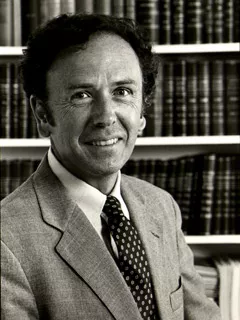Theodore W. Friend
1973–1982

An award-winning historian who pursued his scholarly interests with passion and conviction, Theodore Wood Friend, III (1931-2020), known to all as "Dorie," came to Swarthmore with the goal of rebuilding trust and a sense of community on campus after the challenges of the late 1960s and early 1970s. During his tenure, the faculty gained a greater voice in setting policy, and students, too, gained positions on important committees. He oversaw Swarthmore’s first capital campaign, The Program for Swarthmore. He also established an Advisory Council on Resource Use and led the faculty in a careful evaluation of the Honors Program.
In his inaugural address, Friend said he eschewed the “well-rounded person” as an educational but empty ideal, noting that “ball bearings are well-rounded, well-tooled, and useful, but they supply neither motive power nor direction.” An “intellectual person” was not a satisfactory ideal either, because he said it stresses “only a part” of being human. Instead, in articulating his aspirations for the College, Friend shared his own lived ideals when he concluded:
“In any summary phrase there is the danger of saying both too little and too much. I knowingly risk that danger in saying that we will do well to think of educating moral persons. To me this means whole persons, aspiring to excellence in chosen fields and pursuits and putting thought, word, and act to the tests of integrity.”
Friend began his academic career as a historian at the State University of New York, winning the Bancroft Prize in American History, Foreign Policy, and Diplomacy for his first book, Between Two Empires: The Ordeal of the Philippines, 1929–1946 (1965). After Swarthmore, he served as president of Eisenhower Exchange Fellowships from 1984 to 1996, and served for many years as a senior fellow in the Asia Program at the Foreign Policy Research Institute. Learn more about President Friend.



